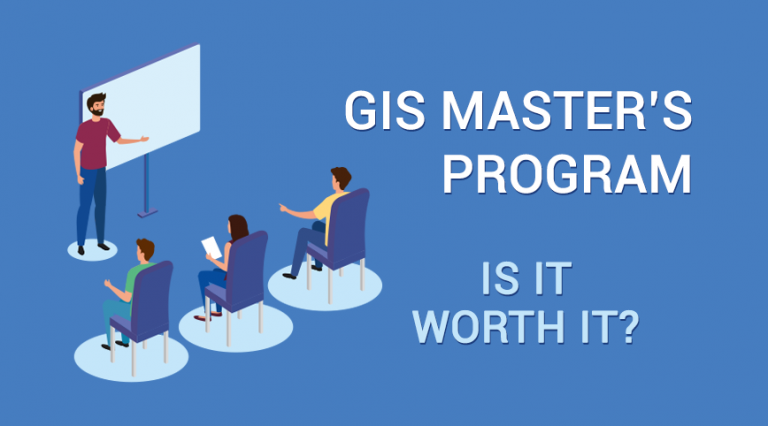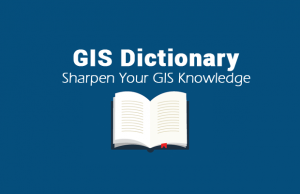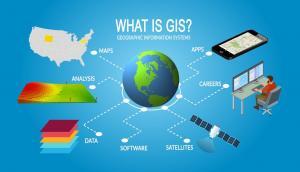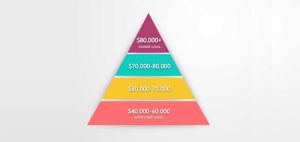Is a GIS Master’s Degree Worth It?

Is a GIS Master’s Degree Worth It?
Are you thinking about enrolling in a GIS Master’s degree program?
But the problem is that you don’t know if it’s the right path to go forward.
If this sounds like you, then you’ve come to the right place.
Today, we weigh the pros and cons of graduating with a GIS Master’s degree.
Advantages of a GIS Master’s Degree
Where do you see yourself in the next couple of years? This is the first question you have to ask yourself.
If you look into the future, here are some of the possible advantages after you graduate with a Master’s Degree in GIS:

- For employers that require scientific legitimacy, GIS masters programs job candidates often stand out a bit better, due to their higher education background.
- A Master’s Degree in GIS would be greatly beneficial in the private sector because a consulting company can bill you out at a higher hourly rate to clients.
- If you want to manage or lead a team in a department, Master’s degree programs often dabble with financial, administration, and project management.
- If all things are equal (experience, skills, etc) in a job competition, a GIS Master’s degree can help better secure a job.
When you want to advance in your career, a Master’s degree can help you change directions in your career. Not only can you advance your career, but ultimately you earn higher pay.
But what about basic GIS certification? How does this compare to a Master’s degree in GIS?
Advantages of GIS Certification
If you picture yourself being just a user of GIS software, this is a good indication that GIS certification is best suited for you.
For example, GIS certification is suitable for those seeking careers as a GIS analyst, specialist, or technician. For some folks, these jobs can be just as satisfying career paths.
Here are some advantages of GIS certification:
- GIS certification focuses on practical skill sets and knowledge, so you get a strong foothold in fundamental skills like cartography, analysis, and coding.
- Nowadays, it’s rare to see any type of GIS certification as a requirement in a job description. Despite the lack of need for it, it still can push you ahead of others when applying for a crowded GIS job.
- Because GIS is industry-specific, any Master’s program won’t be able to cover every potential pathway. In the end, it will mostly be all on-the-job training.
GIS certification requires less time and money than a GIS Master’s degree. It’s the time, experience, and networking that provide real value in your GIS career.
Classroom vs Online Master’s Programs
The other argument is that you can learn on your own without certification or a degree. It’s surprising how much you can learn using the Esri $100/year for a personal use license and a bit of Esri training.
While this sounds good on paper, it’s not a reality when you put it into practice. In a rapidly changing field, it’s the Master’s programs that know where GIS is going. For example, look for programs with:

- Web development, GIS programming, and enterprise systems. Because the reality is that the usage of some of these programs can have high costs associated with them too.
- When you’re searching for a GIS Master’s program, keep an eye out for ArcGIS for Server, AGOL, JavaScript API, and emerging technologies.
- But you can also dabble outside the world of Esri such as with AWS, Carto, and Mapbox.
If you want to pursue any type of higher education, do your research and look into the requirements for GIS jobs. Does your dream career really require you to get an MGIS? If yes, by all means, go for it.
If not, GIS certification programs like GISP challenge you for experience, education, and contribution requirements. But Esri’s certification is more knowledge-focused and tests your skills in Esri software.
There are community colleges that offer GIS programs that help put you in the workplace after you graduate. For some jobs, this experience is what really matters most.
READ MORE: 10 GIS Career Tips to Help Find a GIS Job
Other Factors to Consider
Deciding whether a Geographic Information Systems (GIS) master’s degree is worth it depends on your individual goals, career aspirations, and circumstances. Here are some factors to consider when making this decision:

1. CAREER GOALS: If you have a strong passion for GIS and aspire to work in roles that require specialized knowledge and expertise in geospatial technology, a master’s degree can provide you with a competitive edge. Some careers, such as GIS analyst, GIS manager, remote sensing specialist, or geospatial researcher, often require a higher level of education.
2. INDUSTRY DEMAND: The demand for GIS professionals is growing across various industries, including urban planning, environmental science, natural resource management, public health, transportation, and more. Having a master’s degree could open doors to more advanced and specialized roles within these sectors.
3. SKILL DEVELOPMENT: A master’s program can offer in-depth training in GIS concepts, spatial analysis techniques, GIS programming, and advanced GIS software. It can help you develop a robust skill set that can be valuable in tackling complex geospatial challenges.
4. NETWORKING OPPORTUNITIES: Master’s programs often provide opportunities to connect with peers, professors, and professionals in the GIS field. Networking can be instrumental in finding GIS job opportunities, collaborating on projects, and staying updated on industry trends.
5. RESEARCH OPPORTUNITIES: If you’re interested in contributing to GIS research or pursuing an academic career, a master’s program could provide the platform to conduct original research and publish findings.
6. FINANCIAL CONSIDERATIONS: It’s important to evaluate the financial investment required for a master’s degree, including tuition, fees, and potential lost income if you’re leaving a job to pursue further education. Consider whether the potential increase in earning potential and job opportunities will offset the costs.
7. ALTERNATIVE PATHS: Some GIS professionals enter the field with a bachelor’s degree and gain experience through internships, online courses, and professional certifications. These individuals can still succeed in GIS careers without pursuing a master’s degree.
8. EMPLOYER PREFERENCES: Research the job postings in your desired field to understand whether employers prioritize candidates with a master’s degree. Some positions may require a master’s, while others may value practical experience and skills more.
What’s Next?
Most people will tell you it’s not worth it and you can learn all the skills you need on your own time.
Even though this is a valid argument, it also depends on your level of commitment and timeline in life.
In fact, more people who graduate with a Master’s in GIS would recommend getting one than not.
So what’s driving you toward a Master’s degree in GIS? And do you think it will provide value to your career goals? Please let us know with a comment below.
READ MORE: Making the Grade with a GIS Online Certificate Program









I have a BS in Geology and have been working for the last 4 years in GIS. Nowadays it seems for the higher paying GIS jobs they would like you having a Masters. The pay difference depends on where you live and can be $50k more. I’m currently thinking of going to get mine. But I will say programming languages are also something to look into when I was In college they started making it mandatory after I graduated so that’s something I’m personally lacking. But will be looking into it. Hope this helps.
Please can I be working and at the same time do schooling for a US Master’s degree?
First keep in mind…there are two degrees: MS in GIS & MGIS; MS is a more significant degree (MS thesis typically required). I think the 10s of K$ is not worth it. Very few jobs require it let alone need it. I did it for my resume…I could have learned everything on my own through the Internet. It’s been 7 years…not once has a potential employer mentioned my MGIS degree found on my resume. Just get work experience…that’s the most important. And be sure to learn programming skills…this is where the jobs are
I have a bachelor’s degree in geology but it’s been more than 5 years I work as GIS. I would like to have a master’s degree in GIS to create my own company to master the stakes and manage the large-scale GIS projects
Don’t get a PhD unless you want to work in academia, research, or start your own company. You will have trouble getting hired in the private sector as you will be seen as overqualified and too expensive. However, a Master’s is an asset in the private sector, while also qualifying you for more research and public service jobs. I added a MSc in Geography specializing in Remote Sensing to a GIS certificate and it opened some new doors to me.